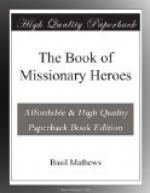His agony of spirit threw him into a high fever that kept him in his bed.
Soon after he heard that another ship was sailing for Africa.
In spite of the protestations of his friends Lull insisted that they should carry him to the ship. They did so; but as the hour of sailing drew on his friends were sure that he was so weak that he would die on the sea before he could reach Africa. So—this time in spite of all his pleading—they carried him ashore again. But he could not rest and his agony of mind made his fever worse.
Soon, however, a third ship was making ready to sail. This time Lull was carried on board and refused to return.
The ship cast off and threaded its way through the shipping of the harbour out into the open sea.
“From this moment,” said Lull, “I was a new man. All fever left me almost before we were out of sight of land.”
V
The First Battle
Passing Corsica and Sardinia, the ship slipped southward till at last she made the yellow coast of Africa, broken by the glorious Gulf of Tunis. She dropped sail as she ran alongside the busy wharves of Goletta. Lull was soon gliding in a boat through the short ancient canal to Tunis, the mighty city which was head of all the Western Mohammedan world.
He landed and found the place beside the great mosque where the grey-bearded scholars bowed over their Korans and spoke to one another about the law of Mohammed.
They looked at him with amazement as he boldly came up to them and said, “I have come to talk with you about Christ and His Way of Life, and Mohammed and his teaching. If you can prove to me that Mohammed is indeed the Prophet, I will myself become a follower of him.”
The Moslems, sure of their case, called together their wisest men and together they declaimed to Lull what he already knew very well—the watchword that rang out from minaret to minaret across the roofs of the vast city as the first flush of dawn came up from the East across the Gulf. “There is no God but God; Mohammed is the Prophet of God.”
“Yes,” he replied, “the Allah of Mohammed is one and is great, but He does not love as does the Father of Jesus Christ. He is wise, but He does not do good to men like our God who so loved the world that He gave His Son Jesus Christ.”
To and fro the argument swung till, after many days, to their dismay and amazement the Moslems saw some of their number waver and at last actually beginning to go over to the side of Lull. To forsake the Faith of Mohammed is—by their own law—to be worthy of death. A Moslem leader hurried to the Sultan of Tunis.
“See,” he said, “this learned teacher, Lull, is declaring the errors of the Faith. He is dangerous. Let us take him and put him to death.”
The Sultan gave the word of command. A body of soldiers went out, seized Lull, dragged him through the streets, and threw him into a dark dungeon to wait the death sentence.




